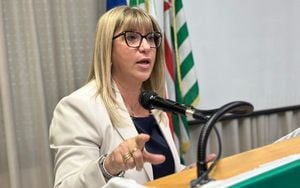AmaZulu King, Misuzulu kaZwelithini, has found himself at the center of controversy following the unlawful suspension of members of the Ingonyama Trust Board, which has drawn scrutiny from Parliament. On Wednesday, the legal advisor to Parliament informed the Land Reform and Rural Development Committee, clarifying the legal ramifications of the king's actions. The advisor emphasized the fact only the minister has the exclusive authority to act on behalf of the board team, which appoints and administers land on behalf of the Zulu nation.
The Ingonyama Trust, established back in 1994, boasts the responsibility of managing nearly three million hectares of land to serve the Zulu people's material welfare and social well-being. Tensions flared when King Misuzulu suspended board members, as interpretations of the legality of his actions began to circulate. Bulelani Simani, the parliamentary legal advisor, addressed the issue by stating, “Having due regard for the above facts, it is quite evident ... he will be acting beyond the scope of his powers.”
Misuzulu proclaimed himself chairperson of the board, which has initiated questions about governance and legal authority within the Trust. This unusual move aligns with Misuzulu’s assertions of the board's financial mismanagement; he even appointed Van Rensburg Kruger Rakwena Attorneys to oversee the legal affairs of the Trust during the absence of the board. This decision, according to Parliamentary Minister Mzwanele Nyhontso, infringes upon the proper legal framework governing the Trust.
The outcry prompted Minister Nyhontso to remind the king explicitly: he does not hold the power to dismiss board members, as this authority lies solely with the minister. Following this reminder, Nyhontso also nullified the appointment of the legal firm, necessitating the board’s decision-making influence.
Subsequently, the Ingonyama Trust Board was thrust under pressure, with its office forced to close due to planned protests by amabutho, or Zulu regiments, supporting the king. To resolve the ensuing turmoil, the Land Reform Portfolio Committee, led by chairperson Albert Mncwango, expressed its desire to engage with King Misuzulu directly. This meeting aims to address the rising crisis, reinforce governance structures, and rectify the strained relationship.
Mncwango underscored the significance of the relationship between the board and the king, stating, “The relationship of the board and the King as the sole Trustee is vitally important for good corporate governance of the entity.” This sentiment resonates with the committee's resolve to communicate with the king, urging him to refrain from executing any suspensions until the meeting takes place.
While the political temperature remains high, inquiries have been launched to dig deep and shed light on the circumstances involving the suspension. The board has initiated security measures, evaluating protocols to prevent similar incidences. Importantly, the backdrop of this dispute revolves around the necessity for good governance and the Trust's leadership framework.
The Ingonyama Trust's future hangs precariously, hinging on the meeting between Parliament's committee and King Misuzulu. The upcoming discussions will be pivotal, as they seek to restore order and clarify the authority governing the Trust. With possible legal recourse available to suspended board members, the dynamics of this dispute continue to evolve.
Overall, the conflict mirrors the complexity within traditional governance structures and modern legislative frameworks, prompting reflections on the role of authorities raised through customary law juxtaposed with statutory regulations. The Ingonyama Trust remains on edge as various stakeholders navigate these convoluted terrains.
Whether the community can unite under the authority of the king, or if the minister's legislative power holds sway over the Trust's governance must be seen how these threads intertwine amid rising tensions.
The next steps for both King Misuzulu and the Ingonyama Trust will not only dictate the governance of this significant Zulu institution but may also echo beyond KwaZulu-Natal, reshaping traditional versus institutional authority discussions.



